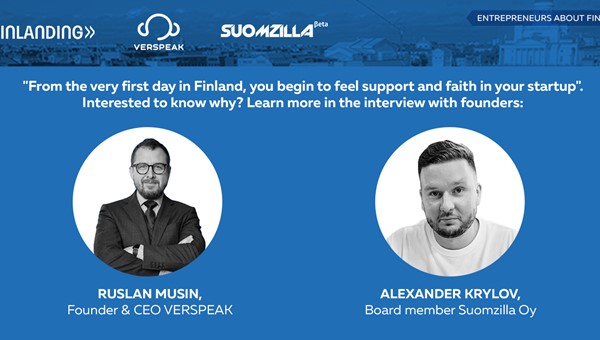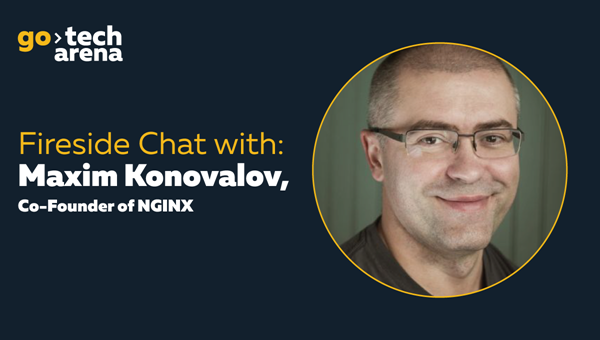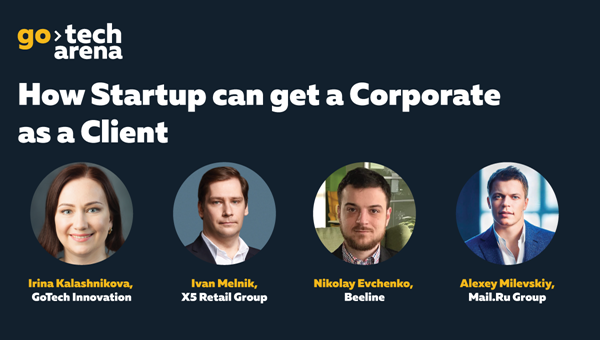3/20/2020
What personal qualities of startup founders contribute to their success?
At the TechChill conference, which was held in Riga on February 21-22, 2020, the GoTech Innovation team organized a round table where its participants tried to figure out what personal qualities of startup founders and their teams can contribute to successful development.

GoTech Innovation co-founder and CEO Irina Kalashnikova, who moderated the round table, at the beginning noted that, as a rule, discussions about the development of startups come down to discussions of breakthrough technologies, examples of successful venture deals or breakthrough cases. But very few talk about people - the founders, co-founders, and team members. Therefore, it was decided to choose the topic of the round table, where the main thing would be a personality.
Startup is the future big company
Andrius Milinavicius, founder at Baltic Sandbox Accelerator, set the tone for the discussion, noting that a startup should not be looked at as a separate product, but as a future company. He told the story of the Revolut startup, where about 120 people worked 3-4 years ago. Back then, in a conversation with a friend working in this company, Andrius asked: “Do you have corporate processes?”. In response, he heard that they are not needed and hamper the development. Next time Andrius visited the company’s office, 700 people already worked in it. At that moment the founder understood that it was time to change previous views.
Openface co-founder Natalya Martynova continued Andrius’ idea and noted that a startup can always have two important qualities: “being able not to follow the rule and being able to follow the rule”, and between them it is necessary to seek a balance. “In my experience, people often switch to startups because they don’t like regular management and the routine. It seems to them that they will be able to build some kind of a unique system where this will not happen. But it is exactly regular management that appears after the first employees come to you. And from that moment you stop coming up with ideas”.
«Sometimes I even think that the founder should not be CEO», - added Andrius Milinavicius. A student Otabek Khamidzadze agreed with him, and noted that each entrepreneur can distinguish two roles: a manager (boss) or a leader. The difference is that a boss gives instructions and wants to see the result, and the leader, who does not have to be a CEO, can be an essential part of the group, he works within the team. In the second case, the team will be effective in terms of organizational behavior, where the leader is responsible for the motivation of each participant.
Personal and team qualities
Konstantin Sinyushin, managing partner at the Untitled Ventures, expressed the opinion that the success of a startup depends on the team, where all competencies should be covered, the main of which are: technological, communicational, and commercial. All of the above is rare in one person only. It is better if they are shared among co-founders. In his practice, there were cases when the founder believed that he was ready to be responsible for absolutely everything in his business. As a result, his staff changed completely every year, which affected slow development of the project, as it took a lot of time to search for new employees.
“The team must be very creative, while motivated for success and the result - money, and, thirdly, people must have a vision of the market and understand what they are willing to pay for,” Konstantin concluded.
Bosnia and Herzegovina startup ecosystem representative Armin Konjalić shared an interesting experience of the emergence of young companies in his country. “In our country, there is 60% of unemployment among youth, therefore, it was decided to support the development of entrepreneurship so that young people could independently come up with a job for themselves. But here arises the question of successful cases (role models), which are still very difficult to find in Bosnia and Herzegovina”.
According to Armin, among the personal qualities required of entrepreneurs, he would point out the crazy optimism: "You have to believe that in 5-10 years, your idea will work". It is also important to be persuasive in order to attract investments or to keep your co-founders close to you, who may at some point consider your idea a gamble.
Alexander Andreev, a venture partner at Almaz Capital, believes that the key quality of a startup is tenacity and persistence, and even rather stubbornness. “The idea of the first startup came to my mind even before the creation of the company and the formation of the team. A few years later, our team developed the first prototype of the product, we had our first sales, and then there was the Dot-com bubble. Everything could die, but we survived. We restarted the business, grew to takeover and took our place in the market. And then later we worked as an R&D team for several years. All this lasted 18 years!”.
Many qualities of startups appear at the time of interaction with investment institutions. “I personally can’t communicate with people who don’t listen,” said Konstantin Sinyushin. - I never impose my opinion on anyone, but if a person is not able to listen to me, then he will be unable to listen to clients. You must be able to listen and extract meaning from what you hear, and to adapt your speech to it. Accordingly, a good seller is not the one who aggressively retells the same script every time, but who knows how make a person talk, after which he understands what they want, and adapt the script to them”. The second point that Konstantin fears is the situation in which startups immediately agree with him on everything.
Vitaliy Yanko, partner at Insta Ventures, said from his experience that he perceives startups only when the founder has complementary partners. The most attractive for investments are balanced teams, including due to, for example, advisers or mentors, not necessarily leaders. “Such double-headed snakes are more attractive to me, it is easier to believe in them from the point of view of investments. Personally, I only treat well self-funded companies: I pulled out, didn’t attract anything, endured, pawned everything I could, bought or went bankrupt, but survived. The success criterion in such cases is some kind of sustainable business”.
According to Alexander Andreev, a startup should have a good understanding of industry trends and its technological capabilities. “The first thing I want to understand is whether the team is capable of technically realizing what it promises”, - added Alexander Andreev. “If people do not have normal engineering practice in creating such systems, then the chances are very small”. Although this condition is necessary, but not sufficient. Technology is only 20% of the business, and 80% of the success of the business is the seller, or rather the entrepreneur, the future CEO.
Do investments spoil startups?
“For me there is no such question. If a startup believes that it earned money by raising the round, then it has no future. The ideal interaction between a startup and an investor is the following: without investment, a startup grows slowly, let's say, linearly, and with investments it will grow quadratically or even faster. In this case both parties will be satisfied with the cooperation”, - said Alexander Andreev.
His opinion on this subject was also supported by Natalya Martynova: “Ideally, I am a supporter of starting earning as soon as possible and stop asking for money from the VCs. When you make a startup, you try to be a little more efficient than the existing model. And if you have a lot of money, then you are not looking for these points of efficiency in the operating model, in the technology, in rolling out algorithms”.
Startup Sacrifices
The discussion ended with an exchange of views on what startup founders sacrifice. The key answer, of course, was time. Other options are family, and indeed the whole life. “It all becomes a sacrifice if the startup does not work,” said Armin Konjalik.
“If you are not ready to make a sacrifice as an entrepreneur, then this road is closed for you”, - Natalya Martynova said harshly. - Undoubtedly, this is a sacrifice of time, comfort, future. Like in a computer game: a bridge crumbles under you, and you run away all the time”. In addition, according to her, the entrepreneur has to deal with dissatisfaction all the time - from users, suppliers or partners, even cofounders, which is normal, since a lot of time is spent together. “It’s important to be able to jump out of this whole circle of dissatisfaction and see progress”.
Andrius Milinavicius suggested looking at the issue from a different perspective. The happiest people, in his opinion, are those who make the product, and not only they, but also the people around, believe in it. “They do more and help than ask for something in return. In such ecosystem, everything will be fine with you. And, most likely, a person will appear nearby who will continue to build a family with you. But, if you overdid it somewhere and want more for yourself than for others, then the wall is not far, and you will crash into it with great speed”.
“Being a startup is a lifestyle: you come up with something new and then you can’t control it”, - concluded Konstantin Sinyushin.














